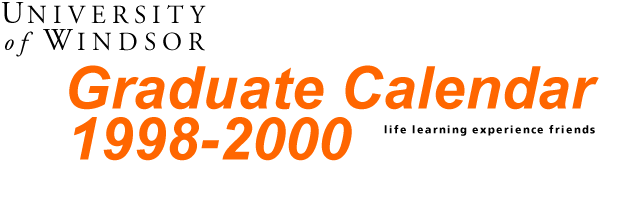

| COLLEGE OF GRADUATE
STUDIES AND RESEARCH
Structure of the College
PROGRAMS OF STUDY EconomicsEducation Engineering - General Regulations
Engineering Materials
Geological Engineering
English
Mathematics & Statistics
|
11
ENGINEERING
MATERIALS
11.1.1 GRADUATE FACULTY Professor Emeritus Youdelis, William V.; B.Sc. (Alberta), M.Eng. Ph.D. (McGill), P.Eng.—1965. Professors Watt, Daniel Frank; B.Sc. (Alberta), Ph.D. (McMaster), P.Eng.—1969. Northwood, Derek Owen; B.Sc. (Eng.), A.R.S.M. (London), M.Sc. (Part I), Ph.D. (Surrey), F.I.M, F.A.S.M., FIMMA, F.I.E. Aust., C.P.Eng. (Australia), P. Eng., Research Professor—1976. Alpas, Ahmet T.; B.Sc., M.Sc. (Middle East Tech. Turkey), Ph.D. (Open University, U.K.) P.Eng.—1989, (Research Professor) Associate Professor Sokolowski, Jerzy; M.M.E., Ph.D. (Tech. U. Silesia, Poland), Ford/NSERC Industrial Research Chair—1993. Adjunct Professors Chao, Benjamin S.; B.S., M.S., Ph.D. (Syracuse)—1993.
11.2.1 AREAS OF SPECIALIZATION Ph.D and M.A.Sc. graduate programs in Engineering Materials are administered by Mechanical and Materials Engineering upon the advice of its Graduate Studies Committee for Engineering Materials. Research is concentrated on the physical, mechanical, tribological and chemical aspects of materials. A Chair in Light Metals Casting Technology is jointly funded by Ford Motor Company and the Natural Sciences and Engineering Research Council of Canada. Particular research topics include: Alloy Design, Development, and Processing: Aluminum alloy (wrought, cast, particulate reinforced), nuclear reactor materials, computer calculation of phase diagrams; structure refinement solidification and precipitation processing; metal hydrides for energy applications. Industrial Materials Development and Processing: Ceramic and cementitious materials; tear resistant elastomers; thermoforming polymers; nanocrystalline materials; tribological properties of composite materials; surface coatings. Mechanical and Tribological Properties of Materials: Creep and fatigue behaviour; deformation mechanisms; friction and wear mechanisms; computer simulation of deformation; corrosion. Light Metals Casting Technology: Advanced foundry processes for lightweight castings; aluminum and magnesium alloys; new generation foundry materials; solidification modelling. Course requirements for the Ph.D. and M.A.Sc. programs in Engineering Materials will be selected from the courses listed below and related courses in other programs. A student's course program will be formulated in consultation with the Graduate Studies Committee for Engineering Materials and requires approval of the research advisor and Chair of the Program Graduate Committee. All courses listed will not necessarily be offered in any given year. 89-501. Advanced Crystallography
89-502. Transformations in Metals
89-504. Thermodynamics of Irreversible Processes
89-505. Strengthening Methods in Crystals
89-506. Microscopy of Materials
89-507. Fracture Mechanics
89-508. Radiation Damage in Metals
89-509. Configuration and Properties of Materials
89-590. Special Topics in Materials
Current topics include: Creep of Metals and Alloys;
89-797. Thesis 89-798. Dissertation |

|
©1997 University of Windsor Although care has been taken in preparing the information in this site the University of Windsor cannot guarantee its accuracy. |